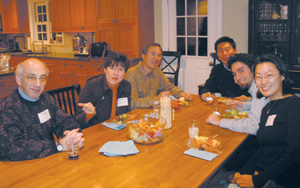|
|
 |
 |
 |
 |
|
AROUND THE QUADSCAMPUS BULLETINSKLUGESOn September 12, nine Kluge Fellows, who collaborated with faculty on summer research projects, gave presentations in Lerner Hall about their work at the third Annual Kluge Fellows Research Symposium. Denaka Perry ’04, Stephanie Leon ’04, Alden Young ’04, Bethlehem Hailu Dejene ’05, Ileana Mendez-Penate ’04, Andrea Woodley ’05, Marvin A. Edmead ’04, Milka Milliance ’04 and Silvia Noemi Banderas ’04, who received the prestigious fellowships, summarized their projects. “Everyone approached their summer in a different way,” observed Lavinia Lorch of the Scholars and Fellowships Office, who introduced the symposium. For example, Perry, an English major with a history concentration, started the symposium with her presentation, “High Stakes: The Impact of Federal Recognition on Education Opportunities for Members of the Golden Hill Paugussett and the Mashantucket Pequot Tribal Nations.” Dejene, who worked with Professor of Anthropology John Pemberton, researched the survival of the Degua Liturgy in Ethiopia, and Young, a history major, discussed “Two Men’s thoughts on the Nature of Liberalism and Imperialism, Around the Time of the Alexandrian Bombardment of 1882.” Other topics included education among Native Americans and its effects on families; the adult-entertainment industry and zoning laws; safe-sex education; female sexuality in Haiti; and victims of the World Trade Center tragedy. Sponsored through the generosity of John Kluge ’37, the Kluge Scholars Program benefits outstanding young adults from under-represented communities at the College, in particular African-American, Latino/a and Native American students. Its goal is to enhance the students’ academic experience and provide exposure to a vast and diverse array of future options in their areas of interest. Streaming videos of the Kluge symposium presentations are available at www.college.columbia.edu/aboutcc/news/. UFMUniversity Food Market at Broadway and 115th Street, the market of convenience for students for the past two decades, changed ownership in November with the retirement of Charlie Pastor and Herb Estrin (the latter formerly of Mama Joy’s). UFM now is owned by Morton Williams Associated Supermarkets, a Bronx-based company that owns nine other supermarkets in the city and is part of a cooperative of 140. The market was open but undergoing renovations as this issue went to press, with plans for improved registers and lighting and 24-hour operations. UFM opened in 1962 and replaced the corner sandwich shop Takome, which Pastor also operated. KITCHERProfessor of Philosophy Philip Kitcher is the recipient of the Romanell-Phi Beta Kappa Professorship in Philosophy for the 2003–04 academic year. The professorship honors distinguished achievement in philosophy, and the winner presents a series of special lectures at his or her school. Kitcher will present three lectures under the overall title, “A Naturalistic Impulse,” on successive Tuesdays beginning February 17. The individual lectures will be “Beyond Religion” on February 17, “The Growth of Knowledge” on February 24 and “The Evolution of Values” on March 2. Lectures are scheduled to take place in Davis Auditorium at Schapiro Hall on 120th Street and are open to the public. For additional details, write to ccpbk@columbia.edu. GENOMESThe National Human Genome Research Institute presented Columbia with a three-year, $11 million grant and the title of a Center of Excellence in Genomic Science. Columbia will emphasize genomic approaches to neuronal diversity and plasticity. At present, the sequencing of an individual’s genome — a process necessary to understand why some people develop certain diseases and others do not — is a time consuming and costly process: about $50 million. Scientists at the new Columbia center will work to develop three new genomic technologies that will facilitate and make the sequencing process less expensive and more accurate. The technologies then will be used to study genes and their functions in neurons related to learning and memory and to explore how genes regulate behavior. The principal investigator of the new center is Jingyue Ju, associate professor of chemical engineering and head of DNA sequencing and chemical biology at the Columbia Genome Center. He will lead the project with co-investigators University Professor Eric Kandel, winner of the 2000 Nobel Prize for Physiology or Medicine, and Leonid Moroz, assistant professor of neuroscience at the University of Florida, as well as a team of accomplished professors and researchers from Columbia and other universities. STRINGThe Elegant Universe, the groundbreaking book on string theory by Professor of Mathematics and Physics Brian Greene (CCT, September 1999), was adapted by PBS’ NOVA into a three-hour television documentary. It aired on WNET in two parts during October and November. YIDDISHThe Committee on Instruction has approved the creation of an undergraduate Yiddish major and concentration, making the College one of the few schools to offer a degree in Yiddish studies at the undergraduate level. Columbia’s Yiddish Studies program was established in 1952 under the linguistics department and moved to the department of Germanic languages in the 1980s. In the past four years, enrollment in Yiddish language classes has risen from 37 to 74. Yiddish is historically the language of Central and Eastern European Jews and is a fusion of German dialects with Slavic, Hebrew, Aramaic, Romance and English influences, retaining the Hebrew characters and writing from right to left. Before World War II and the Holocaust, it was spoken by more than 11 million people, primarily in Eastern Europe. THEATREAs part of President Lee C. Bollinger’s plan to offer New York’s cultural and artistic activities to Columbia students, the University has signed an agreement with the nonprofit theatre company Manhattan Theatre Club to buy approximately 200 front-row tickets to shows at the Biltmore, MTC’s new Broadway house. The tickets will be divided among three plays and distributed free to Columbia students on a first-come, first-served basis. The first set of tickets was offered for The Violet Hour, a new play by Richard Greenberg that opened on October 16. Students, Alumni Gather
|
|
|||||||||||||||||||||||||||||||||||||||||||||||||||||||||||
